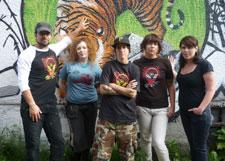“It’s about social change and people’s struggle for justice,” says artistic director Meegan Maultsaid, describing the Under the Volcano Festival as it enters its 20th and final year. “We create space for marginalized, political, radical voices.”
The volunteer-run, independent festival, with its by-donation admission, has always prided itself on not being a corporate or commercial event.
“Many festivals are modelled within a corporate framework, predominantly focused on mainstream artists who are more digestible, don’t push people to think, question their own privilege or think about other voices,” says Maultsaid.
“We operate under the radar of mainstream music culture. Our program is a diverse range of artists, providing space for radical voices that don’t have a spotlight on them in the mainstream.”
More than just music, Under the Volcano also features an information fair with more than 100 different community groups.
“It’s an interesting way to bring people into awareness around issues and a real celebration of all the great work being done,” says Lorraine Grieves, who organizes the info fair.
“I think all of us realize that our freedoms are tied to the freedoms of others; an Aboriginal sovereignty movement is tied to queer issues.”
“A part of building an activist movement is finding those alliances, the common thread in local and global issues,” explains Maultsaid. “Under the Volcano is a recharging of batteries for activists. It’s a positive atmosphere and an important day of networking and outreach.”
The festival is put on by a non-profit society with an organizing committee of six people, five of whom are queer or active in the queer community. “Queerness to me is doing things in ways that aren’t normative,” says Grieves.
“Lots of queer people have struggled and been involved in gay or trans rights and that makes them aware of other struggles,” says Maultsaid. “With Under the Volcano, we see queer activists and activists that are queer-involved in the larger struggle for justice and human rights.”
“This is the 20th anniversary of the festival and my 15th year being involved,” Maultsaid continues. “One of my bands played at the fourth festival, and the following year I joined the collective.
“The legacy we have after 20 years is that we have always stuck to our ethics, even when it’s been challenging. It’s proof that a small group of like-minded, committed people can make a difference. For two decades we’ve been an activist-oriented project and we have kept our integrity as an ethical, political, radical festival.”
“I grew up in North Vancouver and knew the festival as a young person in my 20s, and it gave me a totally radical experience,” Grieves recalls.
This year, as the festival comes to a close, one of the topics explored will be the last 20 years of activism and resistance in BC.
“We are stopping primarily for financial reasons,” Maultsaid explains. “It’s a risky endeavour to run a non-corporate event that is accessible to the community, and it’s a risky way to produce an event that is so big.”
With 50 percent of the revenue for the festival coming from ticket donations, an unexpected low turnout last year proved financially crippling. “We had extremely terrible weather and lost about $17,000,” Maultsaid says. “We had been saving money for our 20th anniversary, and we were lucky to have that money saved.”
“As organizers, we deeply love and care about the festival. I have given 15 years of my life. For people who have never been, it’s their last chance,” Maultsaid adds.
“It’s important for people to come,” Grieves agrees. “It’s a unique opportunity.”
The collective will stay together and plans to produce other events in the future. “It’s just as important today if not more,” says Grieves. “I think there are many urgent issues and that everyone needs to engage in problem solving together. There are environmental issues, war issues and people who are oppressed and struggling all the time. It’s not a time for complacency.”

 Why you can trust Xtra
Why you can trust Xtra


